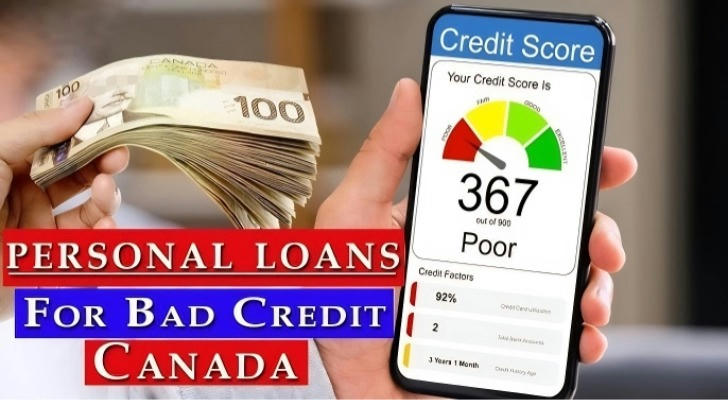Understanding Canadian Loans: Real-World Options, Application Tips & Bad‑Credit Solutions
Whether you’re buying a home, financing a car, funding your education or simply bridging a short‑term cash gap, Canada’s lending market offers a wide array of products. Below is an overview of real Canadian loans, practical application tips, and targeted solutions for bad‑credit borrowers—now including a standalone Cash Loans option.

1. Major Loan Types & Real Providers
a) Mortgages
Fixed‑Rate Mortgage (RBC, Scotiabank, TD)
Offers stable payments over the entire term. RBC Royal Bank, Scotiabank and TD Canada Trust all provide competitive fixed‑rate terms.
Variable‑Rate Mortgage (CIBC, BMO)
Rates adjust with the prime rate. BMO’s Flex Rate Mortgage ties your rate to the bank’s prime plus a margin.
High‑Ratio Mortgage with CMHC Insurance
If your down payment is under 20%, the Canada Mortgage and Housing Corporation insures lenders against default. This allows lower‑down‑payment borrowers to access financing.
b) Personal Loans
Unsecured Personal Loans (BMO, TD, RBC)
Borrow without collateral. BMO’s Personal Loan can be approved through a streamlined online process with rates based on credit score.
Secured Personal Loans (Fairstone, Home Trust)
Use a vehicle, savings account or investment as security for lower rates and flexible terms.
c) Auto Loans
Dealer Financing (Major Banks, Credit Unions)
Many credit unions (e.g. Vancity, Meridian) offer flexible auto loan packages for new vehicles.
Direct Lenders (Carfinco)
Specialize in subprime auto financing, catering to borrowers with blemished credit.
d) Bad‑Credit & Short‑Term Loans
Payday Loans (Cash Money, Money Mart)
Short‑term loans repayable on your next payday, but carry very high APRs—only for immediate emergencies.
Installment Loans for Bad Credit (Fairstone, easyfinancial)
Loans up to a practical limit, with more lenient credit requirements and slightly higher rates.
Peer‑to‑Peer Lending (Borrowell, Lendful)
Matches borrowers with individual investors willing to fund loans at competitive rates.
e) Cash Loans
A Cash Loan is an unsecured personal advance intended to cover unplanned expenses. Key features:
Simple Online Application
Submit basic personal and bank information via a secure website or app.
Flexible Amounts
Lenders will evaluate your credit profile to determine an appropriate limit—no preset minimum.
Interest and Fees Disclosed Up Front
All fees and annual rates are clearly outlined before you accept the offer.
Regular Repayment Plans
Choose a repayment schedule that aligns with your cash flow, whether in installments or a single repayment at term end.
2. Application Tips for Higher Approval Odds
Boost Your Credit Score
Make all existing payments on time.
Keep revolving balances low (under 30% of available credit).
Gather Complete Documentation
ID: Driver’s license, passport or permanent resident card.
Income proof: Recent pay stubs or Notices of Assessment.
Residence: Utility bills or lease agreements.
Compare Pre‑Approval Quotes
- Many banks and online lenders offer soft‑pull credit checks to estimate rates without impacting your score.
Negotiate When Possible
- Credit union members often enjoy more flexible terms—ask about member offers.
Choose the Right Term
- Shorter terms reduce total interest but increase monthly payments; longer terms lower monthly costs but accumulate more interest.
3. Solutions for Bad‑Credit Borrowers
Secured Loans
- Use personal assets as collateral to access lower rates.
Co‑Signer / Guarantor Loans
- A trusted party with good credit can back your loan, boosting approval odds and reducing rates.
Alternative Lenders & Credit Unions
- Community development credit unions and non‑bank lenders often offer small‑loan programs for borrowers with imperfect credit.
Debt Consolidation
- Roll multiple high‑interest debts into one lower‑interest secured or unsecured loan to streamline payments.
Financial Counselling
- Non‑profit agencies (e.g., Credit Counselling Canada) can negotiate with creditors and advise on budgeting.
⚠️ Risk Disclosure & Responsible Borrowing
Even transparent, unsecured Cash Loans or online personal loans carry financial obligations. Borrow only what you can afford to repay: missed or late payments may harm your credit rating and incur penalty fees. Always review the total cost of borrowing (principal + disclosed fees + interest) before accepting any offer.
Conclusion Canada’s lending options—from mortgages and personal lines of credit to specialized bad‑credit and cash‑loan products—can address nearly any financing need. By understanding real lenders and products, preparing a strong application, and choosing responsibly, even those with less‑than‑perfect credit can access the funds they need while maintaining financial health.
